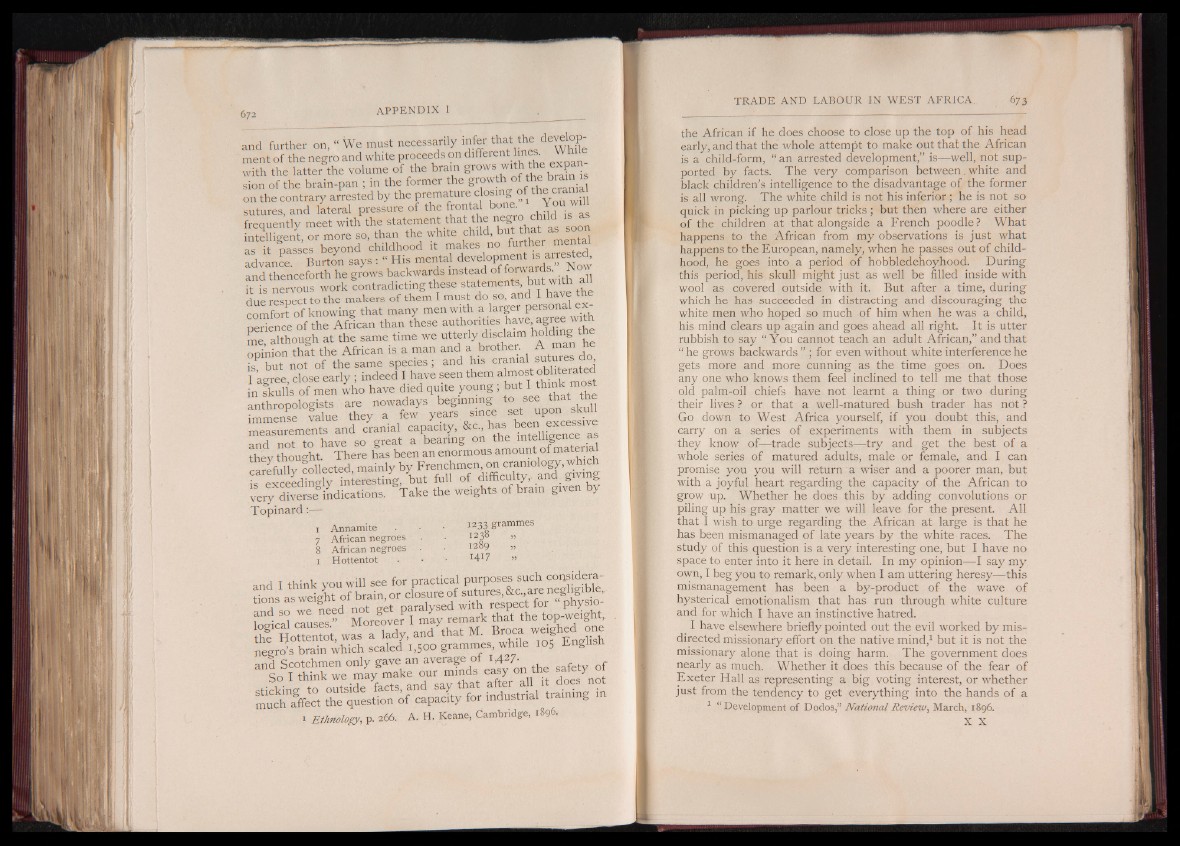
and further on, “ We must necessarily infer that the dev P
ment of the negro and white proceeds on different hnes. While
with the latter the volume of the brain grows with the e x p n
sion of the brain-pan ; in the former the growthofthebramis
on the contrary arrested by the premature1 closing; o the crama
sutures, and lateral pressure of the frontal bone. J o u will
frequently meet with the statement that the negro child g | y
intelligent, or more so, than the white child, mental
as it passes beyond childhood it makes no further mental
advance. Burton says : “ His mental
and thenceforth he grows backwards instead of forwards, inow
ft is nervous work contradicting these statements, but with all
due respect to the makers of them I must do so, and I have the
comfort of knowing that many men with a larger personalex
oerience of the African than these authorities have agree with
me, although at the same time we utterly disclaim holdmg
opinion that the African is a man and a brother. A man h
is but not of the same species ; and his cranial sutures do,
1 ’agree, close early ; indeed I have seen them almostobhterated
in skulls of men who have died quite young ; but l thmk most
anthropologists are nowadays beginning to see that th
I Z S S value they a few years sin.“
measurements and cranial capacity,
and not to have so great a bearing on the intelligence as
they thought. There has been an enormous amount of matei1
carefully collected, mainly b3f " ¿ ^ ^ X ^ a n ^ ’giving
is exceedingly interesting, but full of difhcuity. ano giving
veiy^dlvers^indications. Take the weights of bram given by
Topinard:—
1 Annamite . • • 1233 grammes
7 African negroes . • I23° g
8 African negroes . • I2S9 »
1 Hottentot - ■ ■ ”
a n d T think you will see for practical purposes such consideranegro’s
brain w h i c h scaled 1,Soo grammes, while 105 English
and Scotchmen only gave an average o f M J 7- f
c n T think we may make our minds easy on the salety 01
gg&J&tX ¡S AW “ 1 Ethnology, p. 266. A. H. Keane, Cambridge, 1896.
the African if he does choose to close up the top of his head
early, and that the whole attempt to make out that the African
is a child-form, “ an arrested development,” is— well, not supported
by facts. The very comparison between. white and
black children’s intelligence to the disadvantage o f the former
is all wrong. The white child is not his inferior; he is not so
quick in picking up parlour tricks ; but then where are either
of the children at that alongside a French poodle ? What
happens to the African from my observations is just what
happens to the European, namely, when he passes out of childhood,
he goes into a period of hobbledehoyhood. During
this period, his skull might just as well be filled inside with
wool as covered outside with it. But after a time, during
which he has succeeded in distracting and discouraging the
white men who hoped so much o f him when he was a child,
his mind clears up again and goes ahead all right. It is utter
rubbish to say “ You cannot teach an adult African,” and that
“ he grows backwards ” ; for even without white interference he
gets more and more cunning as the time goes on. Does
any one who knows them feel inclined to tell me that those
old palm-oil chiefs have not learnt a thing or two during
their lives ? or that a well-matured bush trader has not ?
Go down to West Africa yourself, if you doubt this, and
carry on a series of experiments with them in subjects
they know of— trade subjects— try and get the best o f a
whole series of matured adults, male or female, and I can
promise you you will return a wiser and a poorer man, but
with a joyful heart regarding the capacity of the African to
grow up. Whether he does this by adding convolutions or
piling up his gray matter we will leave for the present. A ll
that I wish to urge regarding the African at large is that he
has been mismanaged of late years by the white races. The
study of this question is a very interesting one, but I have no
space to enter into it here in detail. In my opinion— I say my
own, I beg you to remark, only when I am uttering heresy— this
mismanagement has been a by-product o f the wave of
hysterical emotionalism that has run through white culture
and for which I have an instinctive hatred.
I have elsewhere briefly pointed out the evil worked by misdirected
missionary effort on the native mind,1 but it is not the
missionary alone that is doing harm. The government does
nearly as much. Whether it does this because o f the fear of
Exeter Hall as representing a big voting interest, or whether
just from the tendency to get everything into the hands o f a
1 “ Development of Dodos,” National Review, March, 1896.
X X